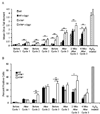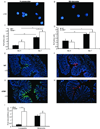Atm-deficient mice exhibit increased sensitivity to dextran sulfate sodium-induced colitis characterized by elevated DNA damage and persistent immune activation
- PMID: 20179206
- PMCID: PMC2831166
- DOI: 10.1158/0008-5472.CAN-09-2584
Atm-deficient mice exhibit increased sensitivity to dextran sulfate sodium-induced colitis characterized by elevated DNA damage and persistent immune activation
Abstract
The role of ataxia telangiectasia mutated (ATM), a DNA double-strand break recognition and response protein, in inflammation and inflammatory diseases is unclear. We have previously shown that high levels of systemic DNA damage are induced by intestinal inflammation in wild-type mice. To determine the effect of Atm deficiency in inflammation, we induced experimental colitis in Atm(-/-), Atm(+/-), and wild-type mice via dextran sulfate sodium (DSS) administration. Atm(-/-) mice had higher disease activity indices and rates of mortality compared with heterozygous and wild-type mice. Systemic DNA damage and immune response were characterized in peripheral blood throughout and after three cycles of treatment. Atm(-/-) mice showed increased sensitivity to levels of DNA strand breaks in peripheral leukocytes, as well as micronucleus formation in erythroblasts, compared with heterozygous and wild-type mice, especially during remission periods and after the end of treatment. Markers of reactive oxygen and nitrogen species-mediated damage, including 8-oxoguanine and nitrotyrosine, were present both in the distal colon and in peripheral leukocytes, with Atm(-/-) mice manifesting more 8-oxoguanine formation than wild-type mice. Atm(-/-) mice showed greater upregulation of inflammatory cytokines and significantly higher percentages of activated CD69+ and CD44+ T cells in the peripheral blood throughout treatment. ATM, therefore, may be a critical immunoregulatory factor dampening the deleterious effects of chronic DSS-induced inflammation, necessary for systemic genomic stability and homeostasis of the gut epithelial barrier.
Conflict of interest statement
No disclosures of conflict of interest.
Figures






References
-
- Sartor RB. Mechanisms of Disease: pathogenesis of Crohn's disease and ulcerative colitis. Nat Clin Pract Gastroenterol Hepatol. 2006;3:390–407. - PubMed
-
- Bredemeyer AL, Sharma GG, Huang C-Y, et al. ATM stabilizes DNA double-strand-break complexes during V(D)J recombination. Nature. 2006;442:466–470. - PubMed
Publication types
MeSH terms
Substances
Grants and funding
LinkOut - more resources
Full Text Sources
Molecular Biology Databases
Research Materials
Miscellaneous

